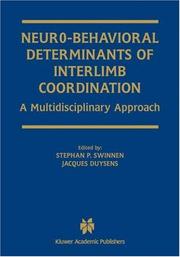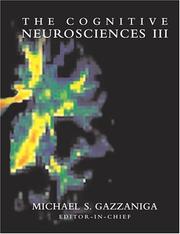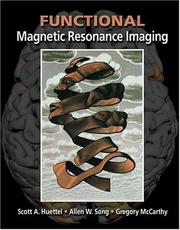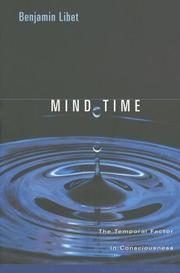| Listing 1 - 10 of 15 | << page >> |
Sort by
|
Periodical
Year: 2004 Publisher: Rio de Janeiro : Instituto de Ciências Cognitivas,
Abstract | Keywords | Export | Availability | Bookmark
 Loading...
Loading...Choose an application
- Reference Manager
- EndNote
- RefWorks (Direct export to RefWorks)

ISBN: 1402077785 Year: 2004 Publisher: Boston Kluwer Academic
Abstract | Keywords | Export | Availability | Bookmark
 Loading...
Loading...Choose an application
- Reference Manager
- EndNote
- RefWorks (Direct export to RefWorks)
Cognitive neuroscience --- Locomotion --- Motor ability --- Regulation
Book
ISBN: 0674040163 Year: 2004 Publisher: Cambridge, Mass. : Harvard University Press,
Abstract | Keywords | Export | Availability | Bookmark
 Loading...
Loading...Choose an application
- Reference Manager
- EndNote
- RefWorks (Direct export to RefWorks)
Our subjective inner life is what really matters to us as human beings--and yet we know relatively little about how it arises. Over a long and distinguished career Benjamin Libet has conducted experiments that have helped us see, in clear and concrete ways, how the brain produces conscious awareness. For the first time, Libet gives his own account of these experiments and their importance for our understanding of consciousness. Most notably, Libet's experiments reveal a substantial delay--the "mind time" of the title--before any awareness affects how we view our mental activities. If all conscious awarenesses are preceded by unconscious processes, as Libet observes, we are forced to conclude that unconscious processes initiate our conscious experiences. Freely voluntary acts are found to be initiated unconsciously before an awareness of wanting to act--a discovery with profound ramifications for our understanding of free will. How do the physical activities of billions of cerebral nerve cells give rise to an integrated conscious subjective awareness? How can the subjective mind affect or control voluntary actions? Libet considers these questions, as well as the implications of his discoveries for the nature of the soul, the identity of the person, and the relation of the non-physical subjective mind to the physical brain that produces it. Rendered in clear, accessible language, Libet's experiments and theories will allow interested amateurs and experts alike to share the experience of the extraordinary discoveries made in the practical study of consciousness. Table of Contents: Foreword Preface 1. Introduction to the Question 2. The Delay in Our Conscious Sensory Awareness 3. Unconscious and Conscious Mental Functions 4. Intention to Act: Do We Have Free Will? 5. Conscious Mental Field Theory: Explaining How the Mental Arises from the Physical 6. What Does It All Mean? Bibliography Index Reviews of this book: Libet only dared switch to the study of consciousness after he got tenure. It is fortunate for us that he did, and that he has presented us here with what amounts to a retrospective exhibition of his work.The refreshing result is that we are immediately engaged in an earnest one-to-one tutorial with [him].In [his] work, philosophers have found grist for what they do best. Indeed, his experiments.must rank as one of the major contributions of experimental psychology to modern philosophy of mind.[W]hether or not one agrees with his thesis or not, one must acknowledge that his pioneering experimental work has certainly been stimulating.--Kevan Martin, NatureReviews of this book: What makes Benjamin Libet different from all the others writing on [consciousness].is that he has actually spent the past 40 years experimenting on the topic. His findings have played a central role in others' speculations. Now he has put his life's work into a single short book.--Steven Rose, New Scientist [UK]Mind Time makes for extremely interesting, engaging reading. Its discussions of consciousness, subjectivity, free will, and perception will intrigue anybody in philosophy or psychology interested in those topics. This is a valuable book to have available.--David Rosenthal, Philosophy and Cognitive Science Graduate Center, City University of New YorkBenjamin Libet's discoveries are of extraordinary interest. His is almost the only approach yet to yield any credible evidence of how conscious awareness is produced by the brain. Mind Time endeavors to clarify these startling observations for the general public, set them in proper framework of neuroscientific knowledge, and probe their philosophical meaning. Libet's work is unique, and speaks to questions asked by all humankind.--Robert W. Doty, PhD, Professor of Neurobiology and Anatomy, University of RochesterThis bo
Consciousness. --- Time perception. --- Memory. --- Cognitive neuroscience.

ISBN: 0618122109 Year: 2004 Publisher: Boston Houghton Mifflin
Abstract | Keywords | Export | Availability | Bookmark
 Loading...
Loading...Choose an application
- Reference Manager
- EndNote
- RefWorks (Direct export to RefWorks)
Cognitive neuroscience. --- Neuropsychology. --- Neurosciences cognitives --- Neuropsychologie --- Cognitive neuroscience --- Neuropsychology --- Neurophysiology --- Psychophysiology --- Cognitive neuropsychology --- Cognitive science

ISBN: 0198508301 9780198508304 Year: 2004 Publisher: Oxford : Oxford University Press,
Abstract | Keywords | Export | Availability | Bookmark
 Loading...
Loading...Choose an application
- Reference Manager
- EndNote
- RefWorks (Direct export to RefWorks)
Alzheimer's disease can be thought of as a multi-faceted neuropsychological disorder, with diverse impairments in cognitive abilities, such as attention, memory, language and executive functioning. Over the last decade cognitive neuropsychology has provided a far richer understanding of these impairments, and this book describes these advances, placing them in their clinical context. The first section deals with background theoretical and clinical issues, such as the extent to which Alzheimer's disease can be considered as a single entity or whether it is more fruitful to explore the neuropsychology of individual patients. It considers the diagnostic aspects of Alzheimer's disease, the natural history of the disease, how it progresses over time and the characteristics of the prodromal phase. A second section, the core of the book, covers major cognitive functions and delineates how impairments can be differentiated from each other. A third portion integrates what is known about cognitive decline with the underlying neurobiological basis, including pathological structural brain abnormality and neuropharmacological changes. The final section explores the clinical implications of the research with an overview of the neuropsychological assessment of this disease, cognitive approaches to management, and neurobiological treatment. As an introduction to this field, The Cognitive Neuropsychology of Alzheimer's Disease brings together the opinion of leading researchers in a book that will provide a useful source of information for neurologists, neuropsychologists, psychiatrists and neuroscientists who wish to broaden their knowledge concerning this debilitating condition.
Book
ISBN: 0674265432 0674020804 Year: 2004 Publisher: Cambridge, MA : Harvard University Press,
Abstract | Keywords | Export | Availability | Bookmark
 Loading...
Loading...Choose an application
- Reference Manager
- EndNote
- RefWorks (Direct export to RefWorks)
Once regarded as a conservative critic of culture, then enlisted by the court theoreticians of Nazism, Nietzsche has come to be revered by postmodern thinkers as one of their founding fathers, a prophet of human liberation who revealed the perspectival character of all knowledge and broke radically with traditional forms of morality and philosophy. In Nietzsche: The Ethics of an Immoralist, Peter Berkowitz challenges this new orthodoxy, asserting that it produces a one-dimensional picture of Nietzsche’s philosophical explorations and passes by much of what is provocative and problematic in his thought. Berkowitz argues that Nietzsche’s thought is rooted in extreme and conflicting opinions about metaphysics and human nature. Discovering a deep unity in Nietzsche’s work by exploring the structure and argumentative movement of a wide range of his books, Berkowitz shows that Nietzsche is a moral and political philosopher in the Socratic sense whose governing question is, “What is the best life?” Nietzsche, Berkowitz argues, puts forward a severe and aristocratic ethics, an ethics of creativity, that demands that the few human beings who are capable acquire a fundamental understanding of and attain total mastery over the world. Following the path of Nietzsche’s thought, Berkowitz shows that this mastery, which represents a suprapolitical form of rule and entails a radical denigration of political life, is, from Nietzsche’s own perspective, neither desirable nor attainable. Out of the colorful and richly textured fabric of Nietzsche’s books, Peter Berkowitz weaves an interpretation of Nietzsche’s achievement that is at once respectful and skeptical, an interpretation that brings out the love of truth, the courage, and the yearning for the good that mark Nietzsche’s magisterial effort to live an examined life by giving an account of the best life.
Consciousness. --- Time perception. --- Memory. --- Cognitive neuroscience. --- Senses and sensation.

ISBN: 0262072548 Year: 2004 Publisher: Cambridge (Mass.) MIT press
Abstract | Keywords | Export | Availability | Bookmark
 Loading...
Loading...Choose an application
- Reference Manager
- EndNote
- RefWorks (Direct export to RefWorks)
Brain --- Cognitive neuroscience. --- Mental Processes --- Neurosciences. --- Physiology. --- Cognitive neuroscience --- Neurosciences --- Neuroscience --- Cognitive neuropsychology --- Cognitive science --- Neuropsychology --- physiology

ISBN: 0878932887 Year: 2004 Publisher: Sunderland (Mass.) : Sinauer associates,
Abstract | Keywords | Export | Availability | Bookmark
 Loading...
Loading...Choose an application
- Reference Manager
- EndNote
- RefWorks (Direct export to RefWorks)
Brain Mapping --- Brain --- Cognitive neuroscience. --- Magnetic Resonance Imaging. --- methods. --- Magnetic resonance imaging.

ISBN: 0262134179 0262633086 026227972X 0585456690 9780262633086 9780262279727 9780585456690 9780262134170 Year: 2004 Publisher: Cambridge, Mass. : MIT Press,
Abstract | Keywords | Export | Availability | Bookmark
 Loading...
Loading...Choose an application
- Reference Manager
- EndNote
- RefWorks (Direct export to RefWorks)
We praten heel de tijd over "onszelf" ... maar volgens Metzinger bestaat er niet zoiets als "onszelf".
Consciousness. --- Cognitive neuroscience. --- Self psychology. --- Psychology --- Cognitive neuropsychology --- Cognitive science --- Neuropsychology --- Apperception --- Mind and body --- Perception --- Philosophy --- Spirit --- Self --- Psychologie du soi --- Cognitive psychology --- Philosophical anthropology --- Conscience --- Neurosciences cognitives --- Cognitive neuroscience --- Self psychology --- Consciousness --- NEUROSCIENCE/General --- PHILOSOPHY/General --- Awareness.

ISBN: 067401846X 9780674018464 0674013204 Year: 2004
Abstract | Keywords | Export | Availability | Bookmark
 Loading...
Loading...Choose an application
- Reference Manager
- EndNote
- RefWorks (Direct export to RefWorks)
Our subjective inner life is what really matters to us as human beings--and yet we know relatively little about how it arises. Over a long and distinguished career Benjamin Libet has conducted experiments that have helped us see, in clear and concrete ways, how the brain produces conscious awareness. For the first time, Libet gives his own account of these experiments and their importance for our understanding of consciousness.
Cogito --- Cognitieve neurowetenschap --- Conscience (Psychophysiologie et philosophie) --- Neuropsychologie cognitive --- Neuroscience cognitive --- Perception du temps --- Cognitive psychology --- Affective and dynamic functions --- Consciousness. --- Time perception. --- Memory. --- Cognitive neuroscience. --- Conscience --- Mémoire --- Neurosciences cognitives --- Consciousness --- Time perception --- Memory --- Cognitive neuroscience
| Listing 1 - 10 of 15 | << page >> |
Sort by
|

 Search
Search Feedback
Feedback About
About Help
Help News
News